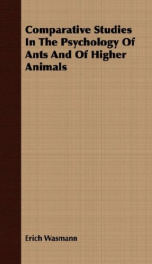comparative studies in the psychology of ants and of higher animals

PREFACE TO THE FIRST EDITION. Of SOME time ago we published an essay entitled Instinct and Intelligence in the Animal Kingdom, examining in detail the concepts of instinct and intelligence, with their application to animals. The discussion showed that intelligence is the spiritual power of abstraction, and not the mere faculty of forming complex sense-representations for the laws of association in sense-perceptions belong to the sphere of instinctive sensitive life and not to spiritual intelli- gence. Now, what modern animal psychology terms intelligence of animals, is nothing but inborn instinct, raised to a higher level of perfection by the individuals sensuous experience. This, in its turn, is based on the very same laws of association of sense- representations. Hence, there is no reason for ascrib- ing to animals intelligence in the strict sense. Indeed, our reasoning led us to take a further step, and we proved that animals have no intelligence at all. If they were gifted with a spiritual power of abstraction, it would necessarily be manifested in their outward actions, especially by the formation of an arbitrary phonetic or graphic language. Animals, however, have no language hence, they have no intelligence. Besides, we have shown in the same essay that the manifestations of the psychic life, both of higher and of lower animals, are to be judged according to one and the same critical standard. The anatomical m Preface to the First Edition. difference, that exists between the sense organs and the nervous system of Arthropods on the one hand and of Vertebrates on the other, is not a sufficient a priori reason for ascribing intelligence to the latter only and denying it to the former. The proof of these assertions forms the groundwork of the present essay. We shall compare more at length the psychic life of the most intelligent Arthropods, namely the ants, with that of the higher Vertebrates and of man. From this discussion we shall learn, whether the missing link, with which modern evolutionists hope to bridge over the chasm between the instinct of animals and the spiritual soul of man, is to be looked for in ants or in the higher Vertebrates, or whether, in fact, it exists at all. Biologists will be pleased to find that the present essay contains many new observations on the habits of ants and their guests. THE PREFACE TO THE SECOND EDITION. numerous observations of modern scientists, illustrating the relations between the psychic life of ants and of higher animals, have been extensively utilized in preparing this second edition. We have paid due regard to the observations and experiments, published since 1897, on the differentiation of castes in bee-hives. Besides, we have turned to account the results of a statistical chart now completed, extending over five years and comprising all the colonies of Formica sanguined in the neighborhood of Exaten, Holland. This ant is the most interesting of all European species. Thus we are able to publish many new facts of interest in scientific biology regarding the slave-making habits of this ant, its methods of nest construction, its relationship to its guest Lomechusa, and the influence of the latter in the differentiation of castes in ant communities. Finally, two additional illustrations of Lomechusa strumosa and of its larva have been added in the text. TRANSLATORS PREFACE...
Info about the book
Author:
Series:
Unknown
ISBN:
0815321961
Rating:
3/5 (2)Your rating:
0/5
Languge:
English
Users who have this book
Users who want this book
What readers are saying
What do you think? Write your own comment on this book!
write a commentif you like comparative studies in the psychology of ants and of higher animals try:
Do you want to read a book that interests you? It’s EASY!
Create an account and send a request for reading to other users on the Webpage of the book!


